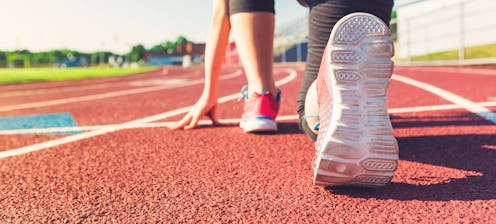
For the majority of us that aren't talented athletes competing at the Summer Olympics, the Olympic Village remains far out of reach — but that doesn't have to stop us from wondering about what they're are up to there. Somewhere in Rio, there are thousands of athletes living together in what are essentially college dorms (and we all know what happens when a bunch of young people live together in student accommodations.) Let's face it: Olympians are hooking up in the Olympic Village – there's just been way too much discussion about it at this point to deny it and it’s also already been confirmed by numerous Olympic athletes. But, is sex actually a good thing when you're competing? Does having sex make you a better athlete or can it interfere?
According to American swimmer Ryan Lochte, "Seventy to 75 percent of Olympians hook up behind the scenes," — but do those athletes actually benefit from hooking up? I spoke with Steve Siebold, a former professional athlete, psychological performance coach to athletes and author of 177 Mental Toughness Secrets of The World Class , to discuss the impact sex has on an athletic performance. It seems that sex can certainly impact athleticism, but whether that impact is positive or negative is just as complex as sex itself.
Intimacy Improves Your State Of Mind
According to Siebold, intimacy can typically be a great advantage when it comes to an athlete's performance. The reason for this is because some people may be happier when they're intimately involved with another person. "The ideal performance state for an athlete is when they are emotionally neutral, as opposed to emotionally charged or discharged," Siebold tells Bustle. "A happy, content state of mind is easily converted to an emotionally neutral state."
Many athletes believe they perform better when they're angry or aggressive, but Siebold refutes that idea. "An emotionally calm, cool, and collected performer can think more clearly, which leads to better decision making and fewer stress related unforced errors," he says.
That's not to say that any athlete that isn't intimate with someone isn't happy, though. "Just because an athlete isn’t intimate at the time, doesn’t mean they are going to perform poorly, but generally speaking, intimacy equates to improved cognition and performance," Siebold says. So, a lack of sex doesn't equate to a worse performance, but having sex does have its advantages.
Sex Can Be A Form Of Stress Relief
Not only does sex help improve your mental state by making you happier, it can also decrease your stress levels. "Competition itself creates enough stress to help the performer rise to his or her personal best, but additional stress leads to poor decision-making and tight muscles," he says. Reducing stress is incredibly important for athletes because, as Siebold says, "as stress increases and the athlete’s performance suffers, more stress is created and the downward spiral begins."
It's All Fun And Games Until Someone Gets Hurt
When it comes to an athlete's performance, there is such a thing as too much sex. "The only time that intimacy could really have a negative impact to an athlete’s performance, is if that person allows it to interfere with sports," Seibold says. For instance, if an athlete is losing sleep because they're staying up late to have sex, they could be too tired to practice or perform well the following day.
A Brazilian diving duo reportedly split up during the 2016 Summer Olympics because a "marathon sex session" got in the way of a good performance, the New York Post reports.
But not enough sex can also hurt an athlete's performance. "Sex-starved athletes can become preoccupied with sex, which can lead to breakdowns in practice, concentration and performance in competition," he says. Hey, sometimes you gotta do what you gotta do. ¯\_(ツ)_/¯
It's What You Make It
Some athletes believe wholeheartedly in the idea that they should be having as much sex as possible before competing. Other athletes think that abstinence during their competition period is the way to go. Both of these choices are valid, and both can work.
What doesn't work is doing something you think won't help you. Siebold points out that even though there aren't any physical advantages to abstaining from sex, for some athletes not having sex, "may be a psychological advantage rooted in their belief system or religious construct." Their belief that abstinence leads to a better athletic performance can partly be "based on myths purposely perpetuated by coaches in an attempt to keep their players from staying up all night carousing and searching for sex," — but, regardless of whether or not they're giving into a myth, no athlete should ever feel like they have to change their sex lives to be better at their sport.
Consent is always key when it comes to anything sexual. An athlete may know all of the benefits to having sex before competing, but if they do it because they think they have to and not because they actually want to or believe it will actually help them, it'll just do more damage than good. Having sex is a choice, and so is how sex impacts your athletic ability.
Ultimately, there are benefits to having sex before competing, but how an athlete's sex life affects their athleticism is really up to them.
Images: Fotolia; Giphy